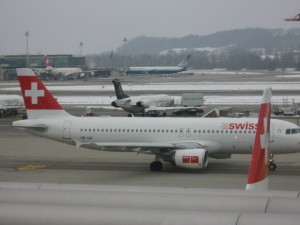By Nicholas Kralev
The Washington Times
January 19, 2009
Have you ever taken advantage of a suspiciously low airfare — say $300 to Europe in business class — that turned out to be a mistake? Did the airline cancel your ticket or did you fight to keep it? If you gave in, it might have been premature.
Like any human activity, filing fares is prone to errors once in a while — a few times a year at most, which is too much for the airlines, but not enough if you ask bargain-hunting travelers.
In the most recent reported example, on Dec. 27, a traveler looking for a ticket stumbled upon a Swiss International Airlines business class fare of $0 plus tax from Toronto to several European cities. It was available on various booking engines, including Swiss’ Web site and Travelocity. The lowest such fare is usually about $3,000 plus tax.
Word of the mistake quickly spread, first through private e-mail messages among friends and later on the travel site FlyerTalk. It turned out that Swiss had filed the same fare on routes from Toronto to India, as well.
Dozens of passengers bought tickets, paying only about $300 to $400 in taxes, in the few hours before a travel agent noticed the online posts about the fare and alerted the airline, which immediately corrected the error, said Swiss spokeswoman Jacqueline Pash.
“We are still investigating how it happened, as outside vendors were involved,” she said in reference to a clearinghouse that airlines use to publish fares. “Once we learned of the error, we tried to contact everyone who booked these fares to let them know their booking had been canceled.”
Some passengers, however, rejected Swiss’ decision and, armed with e-mail confirmation of their purchases, got ready for a fight. Arguing that the airline should bear the consequences of its mistake, some even threatened litigation.
“I entered into a binding contract for air transportation,” Matthew Klint wrote in a letter to Travelocity, on whose Canadian site he’d bought a ticket to New Delhi. “Swiss’ and Travelocity’s efforts to modify, vary or call into question the terms of the contract more than two days after its execution is not acceptable and will be considered a material breach of contract.”
Mr. Klint’s repeated attempts to reason with representatives of both companies proved futile. Travelocity blamed Swiss, saying that “because 78 reservations were made, it would not be willing to pay for a mistake that Swiss made,” he said. But Swiss sent him back to Travelocity, because, “as a travel agency, it’s ultimately responsible for honoring a fare that they confirmed.”
Finally, Mr. Klint’s luck changed when he contacted the Canadian Transportation Agency, which asked Swiss to resolve the issue.
The airline relented, agreeing to fly Mr. Klint in business class from Los Angeles to Zurich and on to New Delhi at no extra cost. The new routing meant it didn’t have to pay Air Canada for flights between Toronto and Montreal in the original itinerary, and it worked out well for Mr. Klint, who lives in Los Angeles and had booked a separate “positioning” flight to Toronto.
“All four flights were wonderful,” he said after he returned home last week. “Swiss’ trilingual cabin teams are superb, and I enjoyed every minute of the roughly 38 hours of flying time.”
Are you happy for Mr. Klint or do you think he was unreasonable in his demand to have his ticket reinstated despite the obvious mistake?
Joseph Schwieterman, a transportation expert at DePaul University in Chicago, said that airlines “usually honor” mistake fares because the public relations “fallout makes it not worth fighting for,” even though they may not be legally required to do so.
In 2007, United Airlines filed a business class fare from the West coast to New Zealand of about $1,300 plus tax — 10 times less than the typical business price. The year before, Alitalia published a fare of about $30 plus tax from Toronto to Cyprus, also in business class. Both carriers honored the issued tickets.
In the Swiss case, the airline agreed to honor bookings on Travelocity as a Canada-based site after being contacted by the Canadian authorities, but those who used Swiss’ own site are out of luck.
“Imagine if I had purchased a nonrefundable ticket and decided 48 hours later that I no longer wished to travel, so I called the airline and asked for my money back,” Mr. Klint said. “Do you think they would be receptive? Of course not, they would laugh at me. It sets a dangerous precedent when an airline can unilaterally cancel a contract because they decide they no longer like the terms.”
This column was first published by The Washington Times

